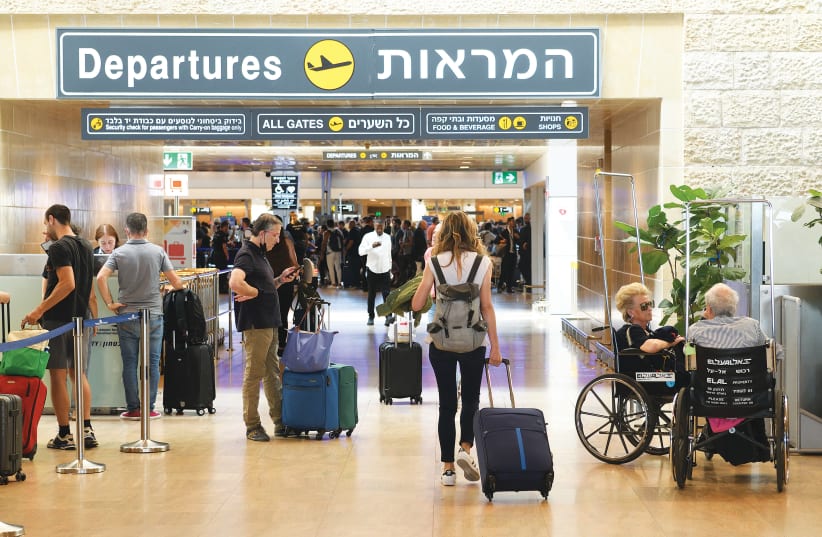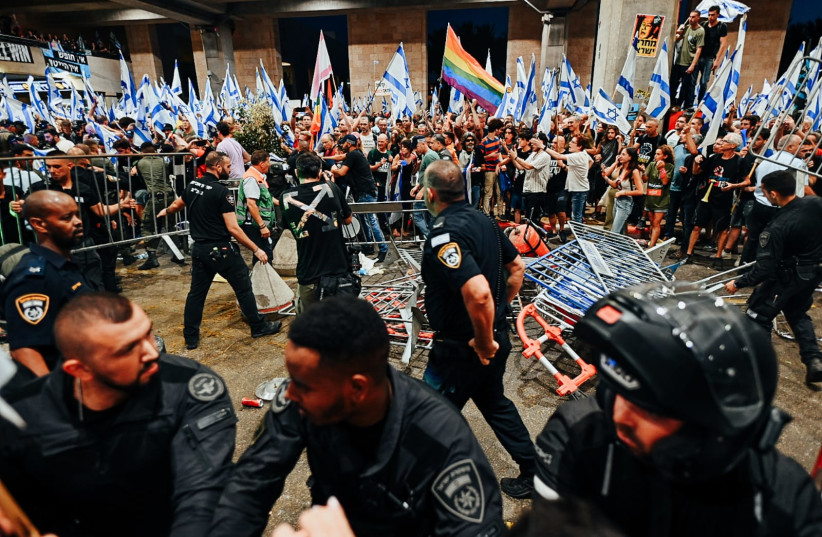The stress that usually accompanies flights was seemingly obscured on Monday at Ben-Gurion Airport due to the protesters who filled its main arrivals hall, including a voice over a loudspeaker in the distance, tantalizing horns, and hundreds of protesters, some wearing Freedom T-shirts and carrying flags and banners.
Starting at 5:30 p.m. on Monday, thousands of anti-judicial reform demonstrators arrived at Terminal 3 to protest the resumption of judicial talks. This coincided with the IDF raid in Jenin.
Travelers who arrived at the airport looked at the overhead screens to locate their flights, some of which were delayed. Many arrived extra early fearing traffic delays to ensure they got to the airport in plenty of time to check-in.
Sisters Rotem and Neta Amitai came to join the protests just before Rotem’s flight to Japan.
They said they have been demonstrating for the last 26 weeks and have been protesting since Prime Minister Benjamin Netanyahu’s 2018 bribery allegations. Rotem said she did not think the protests were “troubling. I have full trust that all the flights will be okay.”
Eliezer Poliakov arrived at the airport from Haifa with his family an hour before his flight.
“We need [the judicial reform],” he said. “Generally in Israel, all these things in society are discussed loudly, and it’s good. Efforts of this reform need to be introduced.”
Other travelers seemed more skeptical about the protests. Aharon Black, 70, came with wife and three of his grandchildren. His other grandchildren were to arrive shortly, as they could not all fit in the car, he said, adding that the protests had not affected their travel plans.
“Being quiet is the best answer,” said Black, who has been in Israel for 48 years and was traveling to New York with his grandchildren. “They are not going to make a difference one way or another. Everybody already knows what their sentiments are.”
Sergay Pavlovsky, who was at the airport with his daughter, Rita, said he was traveling to take care of his mother’s death certificate in Ukraine. He tried to go last year, he said but had to cancel the trip due to logistical obstacles that arose.
Despite the protests, this was as easy as it could have been, Pavlovsky said.
“Today is an absolutely different experience,” he said. “We didn’t feel the strike preparations because we came at about 3 [p.m.]. Israeli society is very polarized. The protests can’t be stopped in one moment. It started when Israel was founded.”
Protests remain an enigma for some
The protests remain an enigma for some who are not well-versed in the discussions surrounding the reforms.
Gal Zinger and his girlfriend, Tal Levi, stood next to each other, vlogging their airport experience. They were flying to California for the next three months and “maybe longer,” Gal said.
They arrived at 4 p.m. for their 1 a.m. flight to avoid any delays because of the protests.
Zinger said he had not attended any protests.
“I don’t have a particular opinion that I want to represent,” he said.
Levi said she believed the protests were important, but she also did not take part.
Zinger remains part of a cohort disillusioned by Israeli politics, amid ongoing protests that threaten to dismantle order and due process of law in society.
A polarized Israeli society has left some jaded, while others said they want to fight for their democracy.

